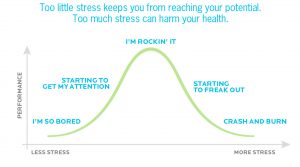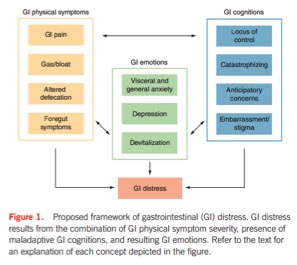All diseases begin in the gut.
– Hippocrates
Read time: 7 minutes
TL;DR Key Points:
- Recovery is essential to everyday life, much like after a workout. The 24 hour adaptation cycle is key concept in this arena
- The brain-gut axis means that gut problems like IBS cannot be understood without addressing psychological factors
- Even if you don’t feel stressed at the current moment, stress influences gut health
- Mean Girls is triggering for all of us
Return To:
Part 1: Gut Feelings: Stress and the GI Tract
Coming Soon:
Part 3: Strategies to combat stress and improve gut health
Wear and Tear: Stress in Our lives
All stress – both acute and chronic, positive or negative, physical or emotional – exerts a toll on our mind and body’s reservoirs. Often these effects can present with intestinal or stomach complaints. Allostasis refers to the process by which our bodies maintain their balance or set point in response to stress in particular. Allostatic load is the threshold after which people develop excess stress and subsequently life and health complaints.
Contrary to popular opinion, stress is not the cause of all human disease. Having said that, it is critical to manage for optimal gut health. Please see our first post on this topic for more information on the new biology of stress, gut, immunology and the microbiome.

Photo cred: https://www.eurekalert.org/pub_releases/2018-04/uab-ipo042018.php
Even social stress can do this to us. This may explain why Mean Girls was so triggering for all of us and why high school is the source of so much angst and acne.
Everyone’s allostatic load is different and changes through time. Many times an inciting or triggering event can be the “straw that broke the camel’s back” and prompt symptoms to emerge that were relatively in check.

This is a great image by the company precision nutrition and I encourage you to visit their website for more great health information www.precisionnutrition.com
This teaches us a few things. First the same event can have different symptoms for different people. We’ve all had different stressors in our lives and different journeys in this world. They have a different cumulative impact on us as individuals. Next stressors can have unpredictable responses how people. Unlike with many medications, we don’t know how particular stressors affect particular individuals at particular times. Lastly, acute symptoms can often have chronic, indolent causes that build up over time.
Stress and trauma can help prime the body for injury and insult. It is often why we are seeing an epidemic of irritable bowel syndrome, fibromyalgia, functional dyspepsia and similar conditions.
Stress can also prompt a sugar binge, as many of us know from first hand experience. Carb comas are so bad but soooo goood.

photo cred: http://cheezburger.com/5946874368
Stress and Irritable Bowel Syndrome
Irritable bowel syndrome (IBS) is the prototypical stress driven disorder. IBS is characterized by changes in bowel habits, bloating and abdominal pain. It is often associated with EAL’s or early adverse life events that may represent sentinel episodes that help cause chronic neurological changes in the gut.
In particular, in gastroenterology there is the “GI Triad” of cognitions, emotions and visceral complaints: physical complains, intestinal emotions, and thought processes regarding such complaints.
Everyone’s triangle is different. Some people have major symptoms but are comparatively not anxious but do ruminate about them. Others have mild complaints but become fatigued and depressed quickly.

This triad explains why numerous studies often link worse GI complaints in patients who have anxiety or maldaptive thoughts. We don’t have convincing data that stress causes stomach ulcers or inflammatory bowel disease (IBD), but it can impair the ability to handle and regulate those symptoms.
The goal of stress management as it relates to gut health is to improve this balance in your favor using strategies that address your particular triangle. This takes a bit of self-examination and monitoring. It is often why the best therapies to improve gut health in IBS are multi-modal: a team approach is necessary to address it. Unfortunately, it is hard to obtain this approach in modern medicine due to the rigourous financially driven healthcare environment.
In the next post, we will look at strategies to combat stress and maintain gut health.
References
[1] Spiegel BM, Khanna D, Bolus R, Agarwal N, Khanna P, Chang L. Understanding Gastrointestinal Distress: a framework for clinical practice. American Journal of Gastroenterology. Am J Gastroenterol. 2011 Mar;106(3):380-5. doi: 10.1038/ajg.2010.383.
[2] Borrell-Carrió F, Suchman AL, Epstein RM. The Biopsychosocial Model 25 Years Later: Principles, Practice, and Scientific Inquiry. Annals of Family Medicine. 2004;2(6):576-582. doi:10.1370/afm.245.